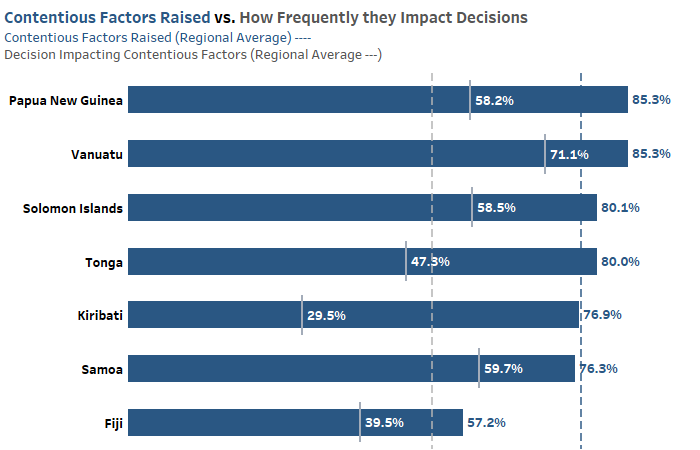
Around the world, there are often significant barriers that prevent victim/survivors of gender-based violence from seeking justice. Even when justice sector institutions – like the courts, healthcare systems and law enforcement – are meant to protect individuals, gaps in protection and accountability are far too common.
Through our analysis of justice sector institutions in the Pacific Island and Caribbean regions, we have found that bias and discrimination present one of the biggest obstacles for access to justice. This might be difficult to conceptualize, so here is a real-life example.
Talia’s Story
To protect the victim’s identity, we’ll call her Talia. Talia and her husband, Luki, had four kids with one on the way. Talia was 8 months pregnant.
One day, Talia asked Luki to attend a meeting at their Pastor’s house. Luki insisted on staying home. According to Luki, Talia asked him if the reason he didn’t want to go to the meeting was because of an affair she’d had in the past. Luki lost his temper, picked up a rock that was being used to hold down a mosquito net, and threw it at her, hitting her in the face. Talia screamed. He ran over and began choking her and covering her mouth. She bit his fingers. He picked up another rock and hit her in the head three times, killing her.
When the case went to court, prosecutors dropped the charge of killing an unborn child and reduced the murder charge to manslaughter, which Luki pled guilty to. At sentencing, his defense counsel brought up a number of “mitigating factors”, which are facts about the case that judges can use when deciding whether to reduce a sentence.
The mitigating factors included that she provoked him to violence by bringing up her infidelity, that she further provoked him by biting his fingers, and that Talia’s family had accepted a cow, two pigs, some fish, ten woven mats and $780 USD in a cultural reconciliation ceremony after her death.
Luki faced 10 years to life for manslaughter. Instead of focusing on his actions, the judge engaged in victim-blaming at the sentencing, stating that Talia’s actions created a “substantial degree of provocation.” The final sentence was five and a half years for killing a pregnant mother of four.
Bias in Judicial Decision-Making
Sadly, Talia’s story is not an isolated case. In the Pacific Island region, we found that bias and discrimination have impacted nearly 80% of cases, with a discriminatory impact on sentencing in over 50% of those cases.

Judicial bias is not the only obstacle. There are many other barriers that arise from cultural practices, healthcare systems, law enforcement, and laws and policies.
Cultural practices can silence women and girls and deny them justice, with religious leaders – untrained on how to counsel survivors – often recommending reconciliation to avoid the stigma that comes with being a survivor. Healthcare providers often fail to document injuries or collect evidence of sexual assault correctly. Police may not take reports seriously, and prosecutors may view customary reconciliation as sufficient grounds to not pursue the matter. Legislation can also be an obstacle – for example, in some countries in the Pacific, marital rape is not a crime.
Supporting Access to Justice
At ICAAD, we developed a Database to track instances of bias and discrimination in thousands of cases and identify these common accountability issues. Armed with information, local civil society organizations and government entities can work to increase protections for victims/ survivors – through developing better laws and policies, training of judges, conducting advocacy campaigns and more. We have already seen the impact of this in places like Fiji, where our work has helped bring about judicial change.
Access to justice for victims/ survivors of gender-based violence is a fundamental human right. It is critical that we all work together to create a world where justice is not just a privilege for some but a right for all. We must work to disrupt the deep-rooted gender stereotypes, customary practices, and structural discrimination that perpetuates violence. We must also demand accountability and transparency from justice sector institutions.
Let us remember Talia’s story and the countless others like hers. Let us recommit ourselves to ending gender-based violence and ensuring that all women and girls can rely on the equitable systems they deserve.
